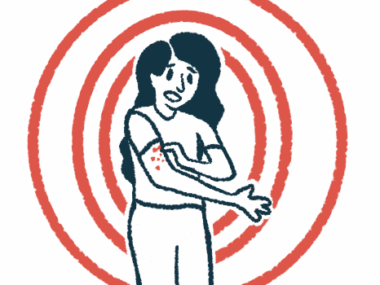Report warns of Cushing’s risk from prolonged nasal steroid use
Betamethasone nasal drops led to Cushing's syndrome in young woman
Written by |

A 21-year-old woman in Iran developed Cushing’s syndrome after using a nasal corticosteroid for about a year, according to a recent case study. The report highlights a warning for patients and doctors: even non-oral steroids, like those delivered through the nose, can lead to serious side effects with prolonged use.
While oral corticosteroids are known to cause Cushing’s syndrome, especially with long-term use, the risks of nasal sprays or drops are less documented.
“This case … emphasizes the importance of heightened awareness among healthcare providers regarding the potential systemic effects of topical corticosteroids, particularly potent formulations such as betamethasone,” researchers wrote. It also “highlights the need for thorough history-taking and detailed patient education to prevent corticosteroid misuse.”
The study, “Cushing’s syndrome in a young woman due to prolonged betamethasone nasal drop use: a case report,” was published in the Journal of Medical Case Reports.
Cushing’s syndrome describes a group of symptoms resulting from elevated cortisol levels in the body. The most common cause is a pituitary gland tumor that produces excess adrenocorticotropic hormone (ACTH), leading to increased cortisol, a condition specifically known as Cushing’s disease. Alternatively, Cushing’s syndrome can arise from prolonged or high-dose use of glucocorticoid medications, referred to as iatrogenic Cushing’s.
Rapid weight gain, irregular periods, mood changes
In their report, the researchers described the case of a young Iranian woman who experienced rapid weight gain — 30 kg (66 pounds) in eight months — irregular menstrual cycles, and mood changes.
After several outpatient visits yielded no definitive diagnosis, she was admitted to the researcher’s hospital for further evaluation. She was classified as obese, exhibited red-purple stretch marks in her abdomen and limbs, and had mild hirsutism (thicker body hair). To treat nasal obstruction, she had been using nasal drops of the corticosteroid betamethasone, administered daily in combination with oxymetazoline, a nasal decongestant, for about a year.
Laboratory work revealed she had low levels of cortisol and ACTH. This indicated a suppression of the hypothalamic-pituitary-adrenal axis — a complex network of pathways that controls the production of several hormones, including cortisol — related to corticosteroid exposure. At a psychiatric evaluation, the woman was also diagnosed with depression.
The patient stopped taking betamethasone nasal drops immediately and was discharged on oral prednisolone with a gradual dose reduction plan. This would allow the progressive recovery of the adrenal glands, the organs that produce cortisol, and prevent adrenal insufficiency.
“Betamethasone nasal drops, although effective for treating nasal congestion and inflammation, carry a potential risk of systemic absorption through the nasal mucosa,” the researchers wrote. “Factors, such as prolonged use and high potency, can significantly increase systemic [exposure].”
This case report “serves as a reminder of the delicate balance between therapeutic benefit and potential harm in corticosteroid therapy and advocates for ongoing research to establish safer prescribing practices,” the researchers wrote.






